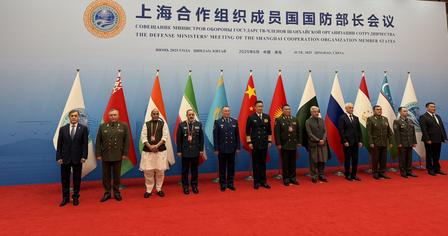
Qingdao (China) — Defence Minister Rajnath Singh has called for united, decisive action against terrorism and the threat of weapons of mass destruction (WMDs) falling into the hands of non-state actors and terror groups. Speaking at the Shanghai Cooperation Organisation (SCO) Defence Ministers' Meeting in Qingdao, China, Singh emphasised that peace and terrorism cannot exist side by side.
Highlighting the key challenges facing the region, Singh pointed to radicalisation, extremism, and a growing trust deficit. "The greatest challenges to our region are peace, security, and the lack of trust. At the root of these problems lie increasing radicalisation, extremism, and terrorism," he stated.
"Peace and prosperity cannot thrive where terrorism exists, or where there is the proliferation of WMDs in the hands of non-state actors and terror groups," Singh warned, stressing that only a united, firm response can guarantee safety and stability.
The Defence Minister also called for accountability for countries that sponsor or shelter terrorism. "Nations that use cross-border terrorism as a state policy must face consequences. There should be no tolerance for double standards. The SCO must not hesitate to criticise such behaviour," he asserted.
Reaffirming India's zero-tolerance approach to terrorism, Singh said, "India’s stance against terrorism is clear in its actions. We have the right to defend ourselves. The epicentres of terrorism are no longer safe, and we will not hesitate to act."
Singh also stressed the need for global action to prevent youth radicalisation, noting the role of the SCO’s Regional Anti-Terrorist Structure (RATS) in coordinating efforts to counter extremism. He cited the joint statement issued under India’s SCO chairmanship on combating radicalisation, separatism, and terrorism as evidence of shared commitment within the group.
The Defence Minister urged members to take action against terrorists using modern technologies, especially drones, for smuggling weapons and narcotics. "In today’s interconnected world, threats go beyond traditional borders — from transnational terrorism to cyber-attacks and hybrid warfare. These threats require transparency, trust, and collective action," he said.
Referring to the April 22 Pahalgam terror attack, where 26 tourists were killed by ‘The Resistance Front,’ an offshoot of Pakistan-based Lashkar-e-Taiba, Singh noted the familiar pattern behind such incidents. He also highlighted India’s response through "Operation Sindoor" on May 7, 2025, aimed at dismantling cross-border terror infrastructure.
"There must be accountability for the perpetrators, organisers, financiers, and sponsors of terrorism, including cross-border attacks. Acts of terror are unjustifiable, regardless of motive, location, or perpetrator. SCO members must condemn terrorism in all its forms," Singh added.
He underlined India's faith in multilateralism, dialogue, and cooperation to prevent conflicts. "No nation, no matter how powerful, can tackle these challenges alone. Reformed multilateralism can foster dialogue, collaboration, and conflict prevention," he said, invoking the ancient Indian philosophy of Sarve Jana Sukhino Bhavantu (May all people be happy).
Singh reiterated India’s commitment to peace and development in Afghanistan, highlighting humanitarian support and ongoing capacity-building initiatives for the Afghan people.
Concluding his remarks, Singh called for stronger cooperation within the SCO, stating, "India supports enhanced cooperation and mutual trust among SCO members. Together, we can meet the expectations of our people and confront today’s challenges. We must stand united to ensure security and stability in our shared neighbourhood."
With inputs from IANS